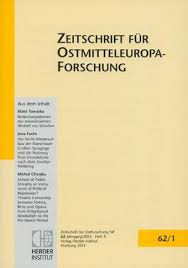Ist maarahvas (‚Landvolk‘), die alte Selbstbezeichnung der Esten, eine Lehnübersetzung? Eine Studie zur Begriffsgeschichte des Ostseeraums
Is maarahvas ('landfolk', 'people of the land'), the former Estonian ethnonym, a loan translation? A study on the conceptual history of the Baltic Sea area
Author(s): Jürgen BeyerSubject(s): Anthropology, Language and Literature Studies, Ethnohistory, Middle Ages, Modern Age
Published by: Verlag Herder-Institut
Keywords: Maarahvas; 'landfolk'; 'people of the land'; former Estonian ethnonym; loan translation; conceptual history; Baltic Sea area;
Summary/Abstract: It is widely agreed that Estonians first started to call themselves eestlased in the second half of the nineteenth Century. Earlier they had referred to themselves as maarahvas ('landfolk', 'people of the land'). Scholars also agree that maarahvas had been used as an ethnonym since time immemorial. Support for this view was sought in Viking age Nordic sources and in comparisons with other Uralic languages. The author argues that the Nordic sources have been misinterpreted and that the Uralic parallels are spurious. He draws attention to those languages Estonians were in contact with in the period 1200 to 1850. All Germanic languages of the time featured words similar to the German Landvolk and meaning 'the native inhabitants of a country'. A comparable expression was also used in the Latin Bible. The word gained ground in Latin and vernacular texts from the eleventh and twelfth centuries, i. e. at a time when the frame of reference for laws changed from tribal to territorial units. This led to new terms based on land or terra, not only Landvolk but also Landmann and Landsprache, i. e. 'the native of a country' and 'the language of a country'. Also these terms found their way into Estonian as maamees and maakeel. In addition to the meanings common in western and northern Europe, in this region they also came to denote the language and the people of one's own country. Only the latter development is original to Estonian. Not only these three Compounds but also a plethora of other words can be traced in all languages formerly spoken around the Baltic Sea. The author calls for a comparative conceptual history of the entire area.
Journal: Zeitschrift für Ostmitteleuropa-Forschung
- Issue Year: 56/2007
- Issue No: 4
- Page Range: 566-593
- Page Count: 28
- Language: German

